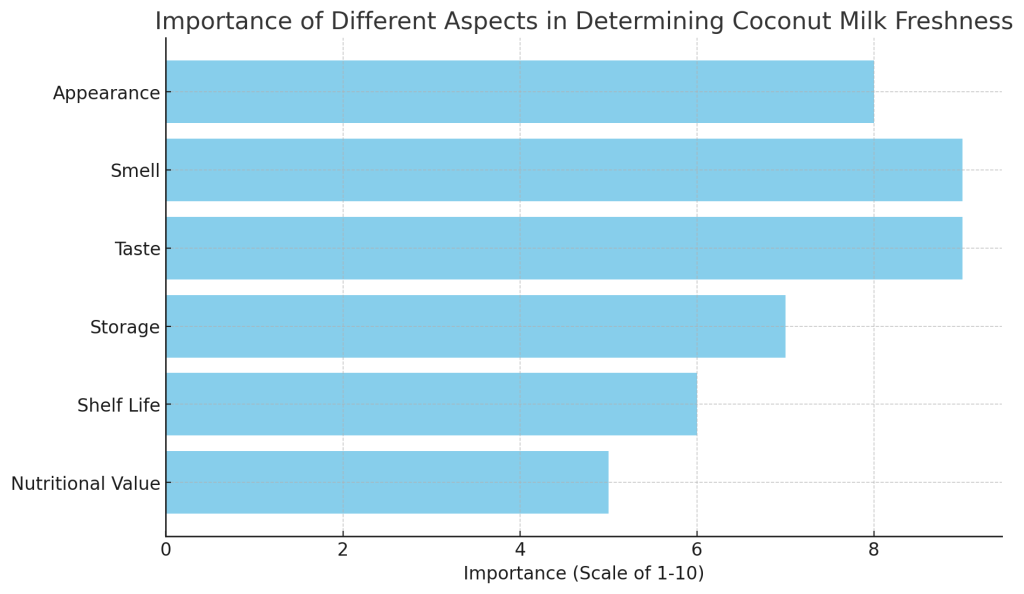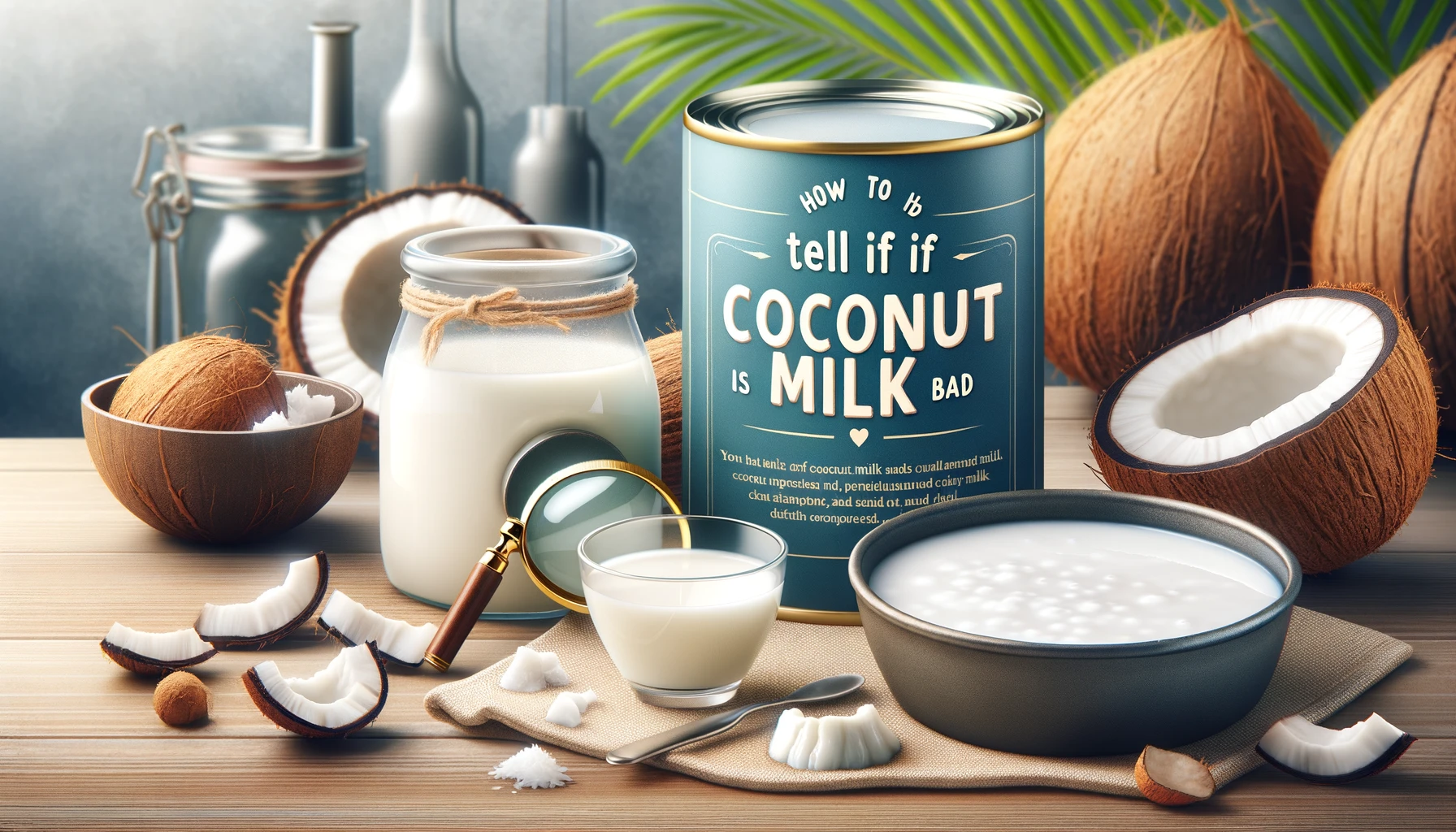Key Takeaways Table
| Key Points | Description |
|---|---|
| Appearance | Signs of spoilage such as color changes and separation |
| Smell | Detecting off odors indicating spoilage |
| Taste | Importance of a small taste test for freshness |
| Storage Tips | Best practices for storing coconut milk |
| Shelf Life | Typical shelf life of coconut milk in various conditions |
| Recipe Integration | Utilizing fresh coconut milk in recipes like chicken curry with coconut milk |
How to Tell if Coconut Milk is Bad: Ensuring Freshness and Quality
Coconut milk, a staple in many kitchens, is beloved for its creamy texture and rich flavor. However, like all natural products, it can go bad. Knowing how to spot spoiled coconut milk is crucial to ensure both the quality of your dishes and your health.
Appearance: The First Indicator
One of the first signs that coconut milk has gone bad is a change in its appearance. Fresh coconut milk has a creamy, smooth texture. If you notice any curdling, lumpiness, or a watery layer on top, this could be a sign of spoilage. However, some separation in coconut milk is normal, especially in non-emulsified, organic varieties. A simple stir might just bring it back to its original consistency.
Smell: The Aroma Test
The smell of coconut milk is another reliable indicator. Fresh coconut milk should have a subtly sweet, nutty aroma. If your coconut milk emits a sour or unpleasant odor, it’s a clear sign that it has gone bad. Trust your nose – if something smells off, it’s better to err on the side of caution.
Taste: A Small Sample
If the appearance and smell don’t raise any red flags, a small taste test can be the final judge. If the coconut milk tastes sour or significantly different from when it was fresh, it’s time to discard it.
Storage Tips: Maximizing Freshness
Proper storage is key to extending the shelf life of coconut milk. Unopened cans or cartons should be stored in a cool, dark place like a pantry. Once opened, coconut milk should be transferred to an airtight container and refrigerated. For longer storage, freezing coconut milk is an option, though it may affect the texture.
Shelf Life: Understanding its Duration
The shelf life of coconut milk varies depending on how it’s stored. An unopened can or carton can last up to five years in the pantry, while opened coconut milk should be used within five to ten days when refrigerated. Always check the expiration date as a primary guideline.
Recipe Integration: Culinary Uses
Fresh coconut milk is versatile and can be used in various recipes. For a delicious example of how to use coconut milk in your cooking, try this chicken curry with coconut milk recipe.
Texture Changes: A Tactile Approach
In addition to visual cues, the texture of coconut milk can indicate its quality. Fresh coconut milk is typically smooth and homogenous. If you detect any gritty texture or excessive thickness, it might be a sign of spoilage. This is particularly important when using coconut milk in recipes where its silky texture is paramount, such as in smoothies or soups.
Health Implications: Why It Matters
Consuming spoiled coconut milk can lead to food-borne illnesses, characterized by symptoms like stomach upset, nausea, and vomiting. It’s essential to ensure that any coconut milk you use, especially in raw preparations, is fresh and safe to consume.
Canned vs. Carton: Does It Make a Difference?
The type of packaging can also influence the shelf life and spoilage signs of coconut milk. Canned coconut milk tends to have a longer shelf life due to the sterilization process during canning. On the other hand, coconut milk in cartons, often found in the refrigerated section, may spoil faster and requires careful storage after opening.
Homemade Coconut Milk: A Fresh Alternative
If you’re looking for the freshest option, consider making coconut milk at home. It’s a simple process involving blending coconut flesh with water and straining the mixture. Homemade coconut milk typically lasts for up to four days in the refrigerator and provides a fresh, preservative-free alternative.
Expiration Dates: A Guideline, Not a Rule
While expiration dates are helpful, they should not be the sole determinant of whether coconut milk is still good. Always assess the milk using the appearance, smell, and taste tests, as coconut milk can sometimes go bad before the expiration date, especially if not stored properly.

Freezing Coconut Milk: Pros and Cons
Freezing coconut milk is a viable option for extending its shelf life. However, be aware that freezing can alter its texture, making it less smooth and more grainy. This change is more noticeable in dishes where coconut milk’s creamy texture is essential. If you choose to freeze it, consider using it in cooked dishes where texture variations are less apparent.
Understanding the Role of Preservatives
Many commercial brands of coconut milk contain preservatives to prolong shelf life. While these can keep the milk fresh for longer, it’s important to understand their impact. If you prefer a more natural product, opt for organic or preservative-free varieties, but be mindful that these may spoil faster.
Coconut Milk in Different Cuisines
Coconut milk is a versatile ingredient used in various global cuisines. From Thai curries to Indian desserts and Caribbean stews, its ability to enhance flavor profiles is unparalleled. Understanding how to keep it fresh ensures that your culinary explorations remain safe and delicious.
DIY Test: Simple Methods to Check Freshness
Besides the traditional methods of checking for spoilage, there are simple DIY tests you can perform at home. One method involves heating a small amount of coconut milk to see if it curdles. While not foolproof, it can provide additional insight into the freshness of the milk.
The Bottom Line: Trust Your Senses
Ultimately, the best method to determine if coconut milk is bad is to trust your senses. Look, smell, and taste are your primary guides. Remember, when in doubt, it’s better to err on the side of caution and discard any coconut milk that seems questionable.
Incorporating Fresh Ingredients: Beyond Coconut Milk
Understanding the freshness of coconut milk opens the door to using other fresh ingredients more confidently. Freshness is key in culinary arts, and this knowledge ensures that every dish, from a simple smoothie to an elaborate curry, is not only delicious but safe to enjoy.
Nutritional Considerations: The Health Aspect
When discussing the freshness of coconut milk, it’s also important to consider its nutritional profile. Fresh coconut milk is rich in vitamins and minerals, including potassium and lauric acid. However, when coconut milk spoils, not only does it become unsafe to consume, but it also loses its nutritional value.
Using Coconut Milk in Vegan and Vegetarian Diets
Coconut milk is a fantastic dairy alternative for those following vegan or vegetarian diets. Its creaminess and flavor make it an ideal substitute in recipes that traditionally use dairy. Ensuring its freshness is especially important in these diets where it may be a primary source of certain nutrients.
Coconut Milk in Baking: A Dairy-Free Alternative
Coconut milk can also be a game-changer in baking. Its rich, creamy texture makes it an excellent substitute for milk or cream in recipes, adding a unique flavor and moisture to baked goods. As with cooking, using fresh coconut milk is vital to achieve the best results.
Pairing with Other Ingredients: Flavor Combinations
Understanding the freshness of coconut milk also involves knowing how it pairs with other ingredients. Its subtle sweetness and rich texture complement a wide range of flavors, from spicy to sweet. This versatility makes it an essential ingredient in a well-stocked kitchen.
Awareness in Purchasing: Choosing the Right Product
When buying coconut milk, consider factors like origin, production methods, and ingredient lists. Organic and sustainably sourced options might offer better quality. Also, some brands might include additives or stabilizers, which could affect freshness and shelf life.
The Global Impact of Coconut Milk Production
Lastly, it’s worth noting the global impact of coconut milk production. Sustainable and ethical sourcing is important, as coconut farming practices can significantly affect local economies and ecosystems. Choosing responsibly-sourced coconut milk contributes to a more sustainable food system.
Final Thoughts: The Importance of Fresh Coconut Milk
In conclusion, understanding how to tell if coconut milk is bad is essential for culinary enthusiasts and health-conscious individuals alike. By focusing on freshness, you can enjoy the full range of benefits and flavors that coconut milk offers, whether in a traditional chicken curry with coconut milk or an innovative vegan dessert.

